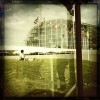Right now is the time of that gap in the time-space continuum when the General Box labelled “Summer” starts to shut slowly taking with it the smells of the sea, the sweaty brow of the aestival traveller and the dizzy dreams of dolcefarniente. At the same moment the musty smells of the humid “Autumn” box […]


